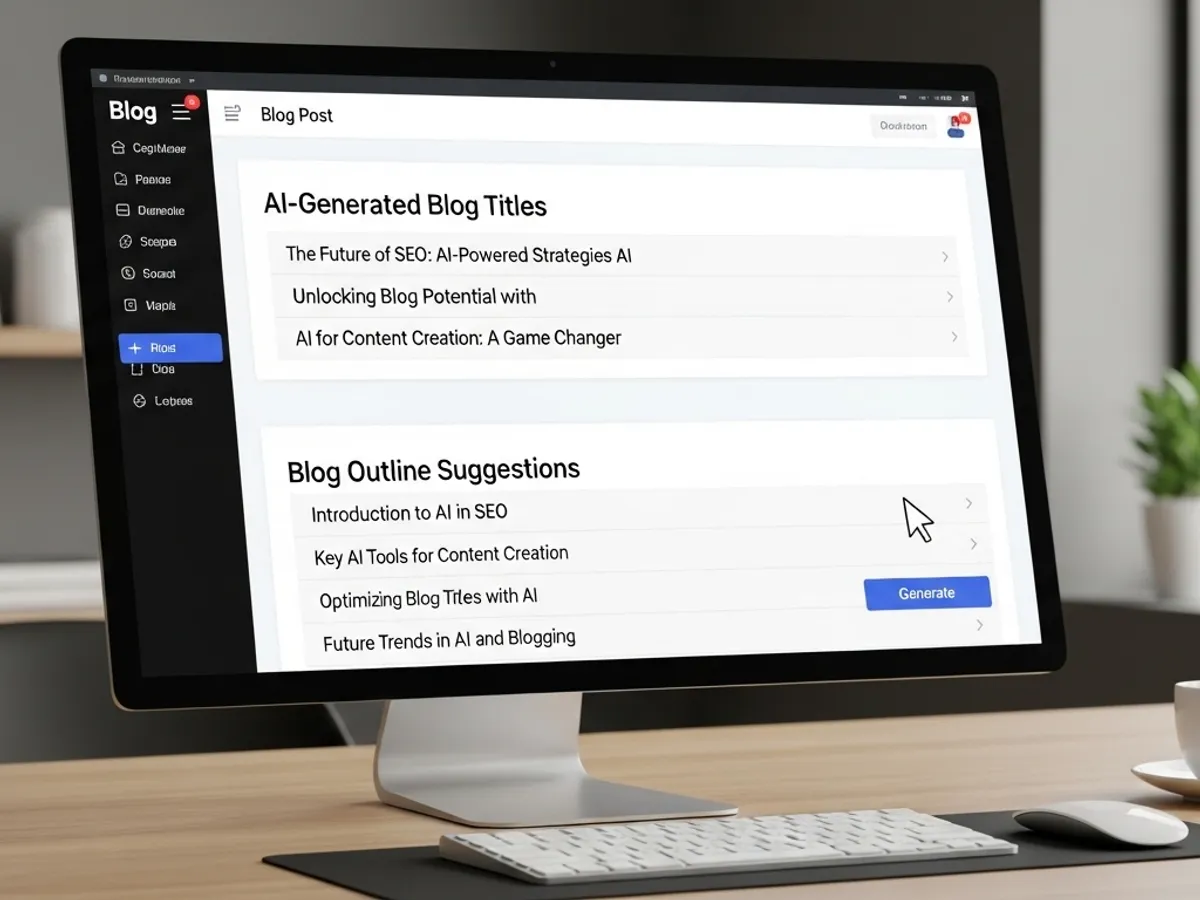
Discover how AI can elevate your blog’s search engine ranking today
Table of Contents
Table of Contents- How AI-Driven Strategies are Revolutionizing SEO for Blogs
- Step-by-Step Instructions: Optimizing Your Blog with AI for Improved Search Engine Ranking
- Tips and Warnings: Maximizing the Impact of AI on Your Blog’s SEO
- Conclusion: Elevating Your Blog with AI-Powered SEO Strategies
- FAQs: Mastering AI for SEO Blog Writing
How AI-Driven Strategies are Revolutionizing SEO for Blogs
The rise of artificial intelligence (AI) presents unprecedented opportunities to improve blog SEO and overall online visibility. By leveraging AI tools, marketing leaders can scale content production, refine content strategies, and achieve higher search engine rankings. This guide explores how to implement AI-driven techniques to enhance your blog’s SEO and attract more organic traffic. According to a recent study, 70% of marketers report that AI tools make their jobs easier, with nearly 40% using AI tools daily.

Step-by-Step Instructions: Optimizing Your Blog with AI for Improved Search Engine Ranking
1. Crafting an AI Content Strategy for SEO Success
Begin by integrating AI into your content strategy to identify trending topics and keywords. Use tools like BuzzSumo and SEMrush to perform keyword research, analyze competitor content, and discover content gaps. Develop an editorial calendar with AI-generated blog post ideas optimized for search engines. AI tools from platforms like BuzzSumo, Ahrefs, or SEMrush can help you quickly identify content gaps and generate new ideas. For instance, AI writing tools like ChatGPT can generate blog titles to fill the “Content Title” column, while SEO tools automatically pull keyword search volumes.

2. Enhancing Content Creation with AI Blog Writing Tools
Leverage AI writing assistants such as ChatGPT, Jasper AI, or Writesonic to draft high-quality blog posts efficiently. These tools can assist with outlining, drafting, and editing content while maintaining a consistent tone of voice. Remember to infuse your unique insights and expertise to create content that resonates with your audience and improve blog SEO. As Leah Messenger, Content Marketing Manager for Optimizely Content Marketing Platform (CMP) solution, notes, if you’re not using AI to make yourself faster, more productive, and more efficient, you quickly fall behind.
{Image: An AI tool suggesting improvements for SEO optimization. Alt text: AI driven content optimization.}
3. Optimizing for E-E-A-T with AIOSEO’s Author SEO Module
Showcase Expertise, Experience, Authoritativeness, and Trustworthiness (E-E-A-T) by leveraging AIOSEO’s Author SEO module. Create optimized author bios to demonstrate your expertise and build credibility with both readers and search engines. Use AI to ensure your content covers topics comprehensively, aligning with user search intent and optimizing for better search engine ranking. Being deliberate about showcasing E-E-A-T content quality guidelines is easier if you have a plugin like AIOSEO.
{Image: Demonstrating expertise through optimized author bios. Alt text: Optimized author bios with AIOSEO module.}
4. Improving Content Readability and SEO Optimization
Enhance readability by using AI algorithms to analyze content structure, language patterns, and user engagement data. Tools like Grammarly and AI Humanizer can refine drafts, making them more natural and human-readable. Optimize content for search engines by incorporating relevant keywords, meta tags, and structure enhancements suggested by AI. You can streamline the writing process, enhance readability and conciseness, and ensure you follow SEO best practices.
{Image: Content readability analysis using AI tools. Alt text: Optimizing content with AI and content readability}
5. Streamlining Content Distribution and Performance Measurement
Use AI to streamline content distribution and accurately measure performance. Employ tools like Google Calendar and Trello to manage your content calendar effectively. Track conversions, engagement metrics, and AI citations to refine your content strategy and improve blog SEO. Monitoring the performance of your blog content strategy is an essential aspect that can’t be overstated.
{Image: Measuring content performance with AI. Alt text: Improving SEO rankings using AI}
Tips and Warnings: Maximizing the Impact of AI on Your Blog’s SEO
- Tip: Train AI tools on your brand voice by feeding them examples of your best content to maintain a consistent tone and messaging.
- Tip: Use AI as a co-pilot, not a replacement, to bring more of your unique perspective and experience to your content. Think of AI as your co-pilot. It’s there to make the process smoother so your story, your voice, and your experience can shine.
- Warning: Avoid relying solely on AI-generated content without adding thorough research and your own insights, which is important for SEO blog writing.
- Warning: Be cautious of using AI primarily for manipulating search engine rankings, as it violates Google’s spam policies. Google’s E-E-A-T stands for Expertise, Experience, Authoritativeness, and Trustworthiness. It is a set of content guidelines Google uses to assess the quality of content on the web.
{Image: An AI assistant helping a blogger with content creation. Alt text: AI streamlining the content creation process}
Conclusion: Elevating Your Blog with AI-Powered SEO Strategies
Integrating AI into your blog writing and SEO processes can significantly enhance your search engine ranking and drive organic growth. By following this AI blog writing guide and implementing an AI content strategy, you can optimize content creation, improve readability, and measure performance more effectively. Embrace AI tools to amplify your content’s reach and relevance, ensuring it resonates with both search engines and your target audience.
Amplify your content’s reach and relevance with GenWrite’s AI blog generator, which automates the end-to-end blog creation process, focusing on SEO optimization.
Enhance your SEO efforts with insights from our blog on AI writing tips, designed to transform your content strategy.
Explore how AI can revolutionize your blog content by creating narratives that truly resonate with your audience; read more on engaging content generation.
Unlock new levels of content potential by learning how to improve blog rankings with AI-driven strategies.
Discover the power of AI blog writing and its ability to streamline keyword research, content creation, and SEO optimization.
Delve into how AI content creation enhances SEO, increases engagement, and uncovers traffic opportunities, streamlining the blogging process.
FAQs: Mastering AI for SEO Blog Writing
How does AI enhance SEO strategies?
AI enhances SEO by automating keyword research, optimizing content creation, predicting search trends, analyzing competitor strategies, and personalizing user experiences to boost rankings.
What are the benefits of using AI in SEO?
The benefits of using AI in SEO include improved efficiency, better content quality, enhanced search engine ranking, and increased organic traffic. AI tools can perform tasks in minutes that would take humans hours or even days to complete.
How can I maintain a human touch while using AI for blog writing?
To maintain a human touch while using AI for blog writing, use AI as a co-pilot to augment your unique perspective and industry knowledge, ensuring your content resonates with your audience. If you rely solely on AI without adding thorough research and your own unique insights, your content won’t stand out.
Which AI tools are best for content creation and SEO optimization?
AI tools such as ChatGPT, Jasper AI, Writesonic, SEMrush, and AIOSEO are effective for content creation and SEO optimization. These days, if you’re not using AI to make yourself faster, more productive, and more efficient, you quickly fall behind.
How do I measure the impact of AI on my blog’s SEO performance?
Measure the impact of AI on your blog’s SEO performance by tracking conversions, engagement metrics, AI citations, and traditional SEO metrics to refine your strategy and improve your search engine ranking.